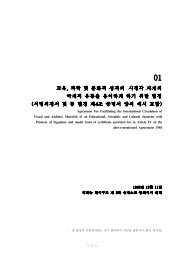íëìë³´ë2012문íì ë°ì ë¼ì´ëí ì´ë¸.pdf - ì ë¤ì¤ì½íêµììí
íëìë³´ë2012문íì ë°ì ë¼ì´ëí ì´ë¸.pdf - ì ë¤ì¤ì½íêµììí
íëìë³´ë2012문íì ë°ì ë¼ì´ëí ì´ë¸.pdf - ì ë¤ì¤ì½íêµììí
You also want an ePaper? Increase the reach of your titles
YUMPU automatically turns print PDFs into web optimized ePapers that Google loves.
Continuation of poverty is due to such irrational choices arising from weak self-control.<br />
Cognitive control acts to bring attention to important goals and restricts automatic behaviors.<br />
Poverty forces a trade-off between priorities, thereby making it more difficult to make<br />
rational decisions. Poor people who make a “trade-off decision” often choose pleasureseeking<br />
consumption for immediate satisfaction rather than education, which is in their best<br />
interest in the long run. To poor people, consumption decisions are always difficult and this<br />
“difficulty” reduces cognitive control.<br />
The reason why self-control matters is because people's higher-order goals that offer longrun<br />
benefits conflict with their lower-order goals offering immediate rewards (Fishbach &<br />
Trope, 2007). The problem with self-control can be seen as a type of motivational conflict.<br />
People need to take counteractive control over temptations to achieve long-term benefits<br />
(Fishbach & Trope, 2005). That is, self-control relates to the construal process of whether<br />
present benefits can be sacrificed for future benefits.<br />
3) Self-Control and Construal Level Theory<br />
The success or failure in exerting self-control is explained in more detail by the construal<br />
level theory (Trope & Liberman, 1998). The construal level theory addresses the individual<br />
cognitive system. According to the theory, people construe things differently based on the<br />
psychological distance, which has an impact on how people approach problems or make<br />
decisions. Events with close psychological distance are low-level construals that emphasize<br />
concrete, incidental, contextual, and instrumental aspects. In contrast, events with far<br />
psychological distance are high-level construals which focus on abstract, decontextualized,<br />
and essential aspects.<br />
Low-Level Construals<br />
(Close Psychological Distance)<br />
Concrete<br />
Incidental<br />
Contextual<br />
Instrumental (the “how” aspect of behavior)<br />
High-Level Construals<br />
(Far Psychological Distance )<br />
Abstract<br />
Essential<br />
General<br />
Decontextualized (the “why” aspect of behavior)<br />
(Table) A comparison of high-level construals and low-level construals (Trope & Liberman, 2003)<br />
Among people who successfully exercise self-control, tacit self-control automatically<br />
occurs in the face of a self-control dilemma (Fishbach et al., 2003). When there is a conflict<br />
between goals (when there is a self-control conflict), important goals (high-level goals) get<br />
automatically activated by the temptation (low-level goals), and an asymmetrical activation
















